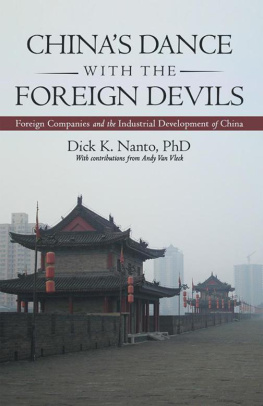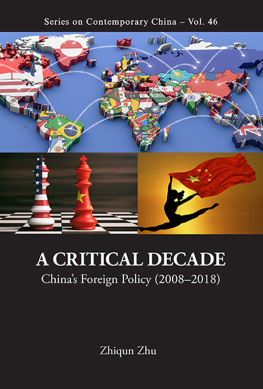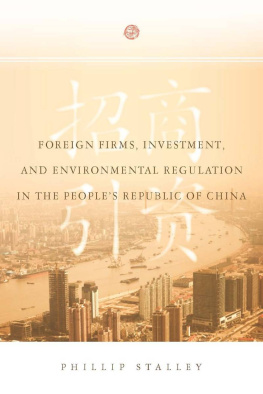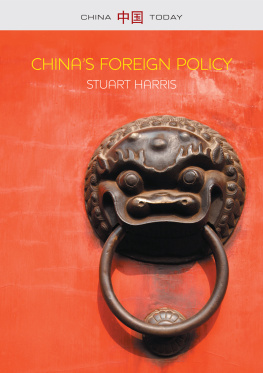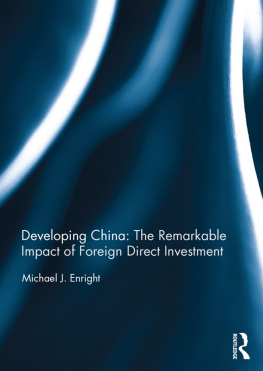CHINAS DANCE WITH
THE FOREIGN DEVILS
Foreign Companies and the Industrial Development of China
DICK K. NANTO
With contributions from Andy Van Vleck

CHINAS DANCE WITH THE FOREIGN DEVILS
Foreign Companies and the Industrial Development of China
Copyright 2016 Dick K. Nanto.
All rights reserved. No part of this book may be used or reproduced by any means, graphic, electronic, or mechanical, including photocopying, recording, taping or by any information storage retrieval system without the written permission of the author except in the case of brief quotations embodied in critical articles and reviews.
iUniverse
1663 Liberty Drive
Bloomington, IN 47403
www.iuniverse.com
1-800-Authors (1-800-288-4677)
Because of the dynamic nature of the Internet, any web addresses or links contained in this book may have changed since publication and may no longer be valid. The views expressed in this work are solely those of the author and do not necessarily reflect the views of the publisher, and the publisher hereby disclaims any responsibility for them.
Any people depicted in stock imagery provided by Thinkstock are models, and such images are being used for illustrative purposes only.
Certain stock imagery Thinkstock.
ISBN: 978-1-4917-9731-0 (sc)
ISBN: 978-1-4917-9732-7 (e)
Library of Congress Control Number: 2016909565
iUniverse rev. date: 07/13/2016
CONTENTS
To Masako, Tom and Frances Nanto
As an economist with the Congressional Research Service, Dr. Dick K. Nanto provided economic analysis and reports to the U.S. Congress on China, Japan and the Koreas. He has published widely on U.S. economic relations with Asia and economic conditions there. He also has testified before Congressional committees on economic issues essential to U.S. national interests. His Doctoral Degree in economics and Masters in national security studies enable him to take a broad view of Chinese industrial development and the role of foreign investment there.
For much of the past two centuries, China has resented the presence of foreigners in its land. Often referred to as foreign devils, Europeans, Americans and Japanese have at various times humiliated, rescued or tried to subjugate the Chinese people. Since 1978, however, China has invited in the foreign devils, first with measured apprehension and then with restrained optimism. Over the ensuing decades, direct investment by foreign companies became a driver of change that has brought the Peoples Republic of China into the modern economic world. Relations between Beijing and foreign companies, including those from the Chinese diaspora in Hong Kong, Taiwan and Singapore, began as a cautious danceat arms length and with both sides wary of each other. The relationship gradually turned into a warm embrace, particularly at the local level, and generated heightened competition throughout the Chinese economy as companies and communities attempted to emulate the production methods and products of the foreigners. Now the PRC has become the second largest economy in the world and is using its economic wherewithal to develop a stronger and more assertive military and national champion companies of its own. Now, foreign companiesno longer feared as devilsare being squeezed by both the Chinese government and by a playing field tilted in favor of domestic Chinese competitors.
This study is intended to help anyone interested in the rise of China, in particular businesses, policymakers and students of the Chinese economy, to understand the role and experience of foreign investors and the business climate in the PRC and to shed light on the motivation behind many of Beijings policies that affect foreign companies operating there.
This book would not have been possible without the support of many people and organizations. I greatly appreciate the Kearney Alliance and Hinrich Foundation for travel grants that enabled me to conduct research in China, Hong Kong, Taiwan and Japan. I also benefitted greatly from discussions with Merle Hinrichs and John Walsh and for their insights into business. I additionally express thanks to Taiwans Ministry of Foreign Affairs for granting me a Taiwan Fellowship and to the National Central University for sponsoring me during a three-month stay in Taipei. I was able to travel numerous times to the PRC under the auspices of the U.S.-Asia Institute. These trips were invaluable in gaining first-hand knowledge of China during the last quarter century. I also appreciate the Congressional Research Service for hosting me as a Visiting Scholar for two years after my retirement.
This book also benefitted greatly from contributions by Andy Van Vleck and for information he acquired through his work in China, Hong Kong and Europe. I also am indebted to Dr. Thomas Lum who reviewed the manuscript and made helpful suggestions and to Michelle Harlan for editorial assistance. Finally, I am deeply indebted to my wife Masako for her patience and support as I worked on the manuscript.
All opinions are my own and should not be attributed to any of the organizations that provided support or to the Congressional Research Service, The Library of Congress or U.S. government.
Alcan | Aluminium Company of Canada |
AMSC | American Superconductor Corporation |
AVIC | Aviation Industry Corporation of China |
BIT | bilateral investment treaty |
BTF | build-to-forecast |
BTO | build-to-order |
CATIC | China National Aero-Technology Import and Export Corporation |
CCB | China Construction Bank |
CDL | IBM China Development Lab |
CFIUS | Committee on Foreign Investment in the United States |
Chinalco | Aluminum Corporation of China |
CIC | China Investment Corporation |
CICC | China International Capital Corp. |
CITIC | China International Trust and Investment Corporation |
CNOOC | China National Offshore Oil Corporation |
CNR | China Northern Railway |
COFCO | China National Cereals, Oils and Foodstuffs Corporation |
COMAC | Commercial Aircraft Corporation of China Ltd. |
Cosco | China Ocean Shipping Company |
CRL | IBM China Research Laboratory |
CSR | China Southern Railway |
DPP | Democratic Progressive Party |
ECFA | Economic Cooperation Framework Agreement |
Fab | Semiconductor fabricator |
FAW | First Automotive Works Corp. |
FCPA | Foreign Corrupt Practices Act |
FDI | Foreign Direct Investment |
FFE | foreign-funded enterprises |
FIE | foreign invested enterprise |
FINSA | Foreign Investment and National Security Act of 2007 |
FIRB | Foreign Investment Review Board |
FLA | Fair Labor Association |

